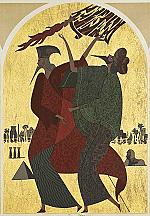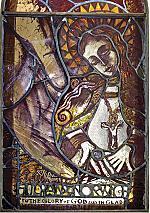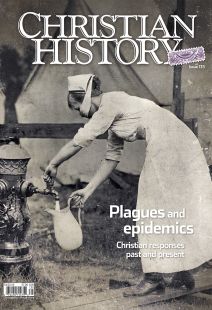Letters, Christian History 135
Spreading the good word
I absolutely enjoy every issue of Christian History! They are among my most treasured books. Thank you so much for the work you do to present this material in a fair and unbiased manner. —Dixie Christensen, Humansville, MO
Thank you for your diligence in providing such a great historical journal.—Laurence Goding, Sun City, AZ
I share CH with seven other Christian brothers and then place it in our chapel’s library! Thank you! —Jack Barry, Chino, CA
Thanks for passing the magazine on, Jack!
New ideas from thoughtful readers
Thank you for your wonderful magazine; it is richly inspiring and factually informative—God’s best on your upcoming efforts. May I suggest upcoming issues for your consideration—the church councils, the various inquisitions—also A. W. Tozer died in 1963; could the staff there produce an issue featuring this man of God for the 60th anniversary of his death?—Michael Carlascio, Sault Ste Marie, ON, Canada
We’ll add Tozer to our list! You can read some stories about church councils and inquisitions in our issues #51, 85, and 129 as well as in our Reformation series (issues #115, 118, 120, 122).
Praise for a challenging topic
I recently finished the Christian History issue on Christianity and Judaism. It was one of my favorite issues. As a person of Jewish ancestry who is also a believer in Jesus Christ, as well as a PhD student whose main research interest is in the relationship to Israel and the church, I found the issue to be informative and well-written. Keep up the excellent work!—Nathan Parker, Hot Springs, AR
Thanks, Nathan! It was a difficult issue to publish, and we appreciate your response.
We also received several lengthy, well-thought-out critiques of issue #133. We are excerpting from them here, with their authors’ permission, as well as excerpts from our answers to them.
Who are the holy people?
Several writers in the latest issue seem to be implying that supersessionism is either wrong or anti-Semitic or both. It seems to me that the two leading alternatives are: (1) the view that all Jews are saved by virtue of the Abrahamic covenant, so they don’t need to know Jesus—which is a heresy, in my opinion; and (2) the Premillennialist view, that there will be a literal thousand-year reign of Jesus from a throne in Jerusalem, so all Jews will see Him and know Him, just as “doubting Thomas” did. The problem with that alternative is that Premillennialism, especially Dispensational Premil-lennialism, is not well supported by inductive exegesis. . . . Jews, like everyone else, need to know Jesus in order to be saved. All the old prophecies have been fulfilled in Jesus, the final faithful Remnant. This is not anti-Semitism. It is merely orthodoxy, as orthodoxy has been understood for most of Christian history.—Robert Hellam, Seaside, CA
From issue advisor Edwin Woodruff Tait: I myself agree with you that there’s no orthodox alternative to saying that we believe Jesus fulfilled the promises of the Old Testament and came to save both Jews and Gentiles. The New Testament seems to me to teach quite clearly that Christians can lay claim to God’s promises to ancient Israel, reinterpreted to mean not temporal blessings as a nation but rather a relationship with God as his holy people, called to be a blessing to the world. If that’s “supersessionism” (and many people would say it is), then I agree that we can’t do without it.
But I think there are ways to nuance this without resorting to either of the alternatives you mention. Paul also seems to say in Romans 9 through 11 that God continues to have plans for Israel as Israel. And he says very emphatically that we, the “grafted-in branches,” should not “boast” over against the original branches, but rather should accept our adoption into “the true Israel” with gratitude and holy fear, recognizing that God has the sovereign power to cut us off as well.
Furthermore the opinions expressed by authors don’t necessarily agree with the views of the editors or the issue advisor, much less the magazine as a whole. We are primarily interested in providing historical information that helps Christians understand and appreciate our heritage, including difficult and controversial parts. In this issue in particular, we sought out Jewish voices as well as Christian authors whom we knew to be particularly concerned with this subject.
Who was responsible?
I must say that with this issue I was beginning to wonder if the editor went to sleep a little? The article “Faith Divided” starts out with a reinterpretation of what appears to be the commonsense interpretation of “His blood be upon us and upon our children.” I do not know everything about history, so I am open to the idea that the author’s suggestion may be historically valid, but I will need to see some source materials before I accept it. Why tweak the meaning from the contextually obvious, “We accept the responsibility for his death”?. . . Are we being anti-Semitic to simply acknowledge that Jews were responsible for the death of Jesus? No, we are just being honest. We begin to be unfair if we hold all Jews accountable for that death. We begin to be unfair if we become anti-Semitic. But we also begin to be dishonest and unfair to blame the pagans. Had no Jews been involved, Jesus would not have died on a cross that day.
—Mike Atnip, Bernville, PA
From issue advisor Edwin Woodruff Tait: The views expressed by Dr. Rosenberg in her article are common among historians. Indeed, many secular scholars would go much farther than she did in questioning the conventional narrative most Christians find in the New Testament. Of course this trend in scholarship is influenced by the desire to avoid anti-Semitism, but solid historical reasons also exist.
This question is one of the major historical difficulties for those of us who believe in the authority and inspiration of Scripture. I think that we can acknowledge that the New Testament authors had every reason not to be too explicit in blaming Rome for Jesus’s death, without accusing them of dishonesty. By saying that Rome condemned an innocent man, they are actually making a powerful statement against Rome. But they’re much more interested in making the point that even the leaders of God’s people rejected Jesus. It’s a matter of emphasis, which would have gotten the right message to their original audience but was later taken by Gentile Christians as reason to blame the Jews and exonerate the Romans entirely.
In short, nobody “fell asleep at the wheel” here. You may disagree with our choice to recruit the scholars we did and not to censor them when they said things that might trouble some of our readers, but it was a very deliberate choice on our part.
A Passover mistake
Mr. Hellam also pointed out that the Hebrew letters are wrong in the plate on p. 33; the letters meant to represent the word Pesach (Passover) actually produce the nonexistent word pemat. Further research shows that these plates were made by DaySpring some years ago. The company later corrected the error.

Meet the staff: Nathan Hillanbrand
What is your role at CHI?
It is my privilege to join the team for a summer journalism internship as part of my undergraduate degree, being mentored in proofing copy, fact-checking, and social media outreach, while gaining an inside look at the many elements required to bring an issue of CH from concept to completion.
Why did you want to join CHI for your internship?
Culling through internship possibilities in fast-paced newsrooms and media outlets, I despaired of finding something even tangentially related to history. Then, on spring break, God intervened. While cleaning out my family’s home office, I came upon a stack of Christian History magazines. Now this would be a perfect internship for me, I thought as I paged through, admiring the aesthetic excellence, breadth of topics, and even-handed coverage. My excitement increased when I discovered that CHI’s office is less than 10 minutes away.
What are you studying and what are your plans for the future?
I am pursuing a history major and journalism minor at Patrick Henry College, where my fall directed research project will be on attempted Hitler assassin Claus von Stauffenberg, exploring the extreme complexities of a man who was both a pious Catholic and a patriotic German officer. Next steps include interning at a history museum and applying to graduate schools.
My dream job would be a writing career, producing inspiring history books for children as well as scholarly articles. However, my highest personal ambition, should it be entrusted to me, is to be a godly husband and the homeschooling father of a lively, joyful bunch of children, which will mean accepting any and all forms of employment.
Any hobbies? What do you do in your spare time?
I participate in karate, orchestral percussion, church/choral singing, equestrian club, and serve at a senior memory care unit. I have been fascinated by historical reenactors since childhood (starting with Williamsburg’s Patrick Henry) and secretly hope that the combination of my community theater training and a graduate degree will land me under a powdered wig someday!! CH
By Readers
[Christian History originally published this article in Christian History Issue #135 in 2020]
Next articles
Editor's note: Plagues and epidemics
Every year this plague issue would get kicked down the road as other issue concepts rose in priority.
Bill CurtisThe plagues that destroyed
A survey of epidemics and some Christian responses
Darrel W. Amundsen and Gary B. FerngrenSeeking renewal
Reflections from a CH staff member on Christian life during epidemics —in the past and at this moment
Dan Graves





